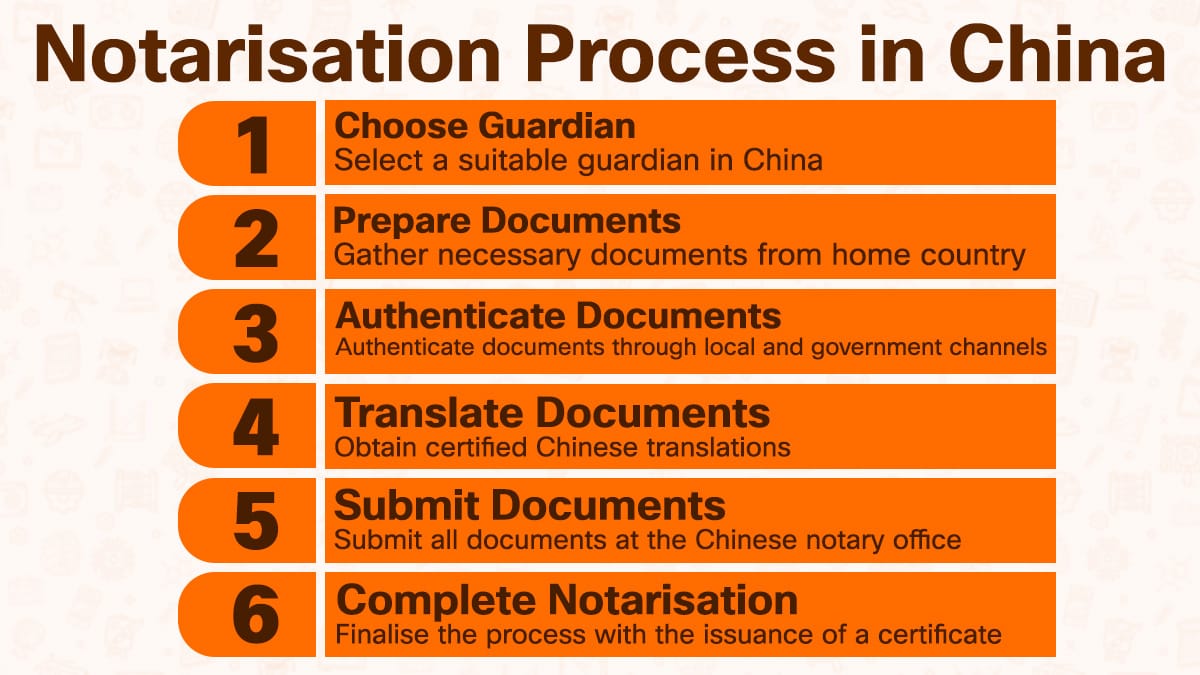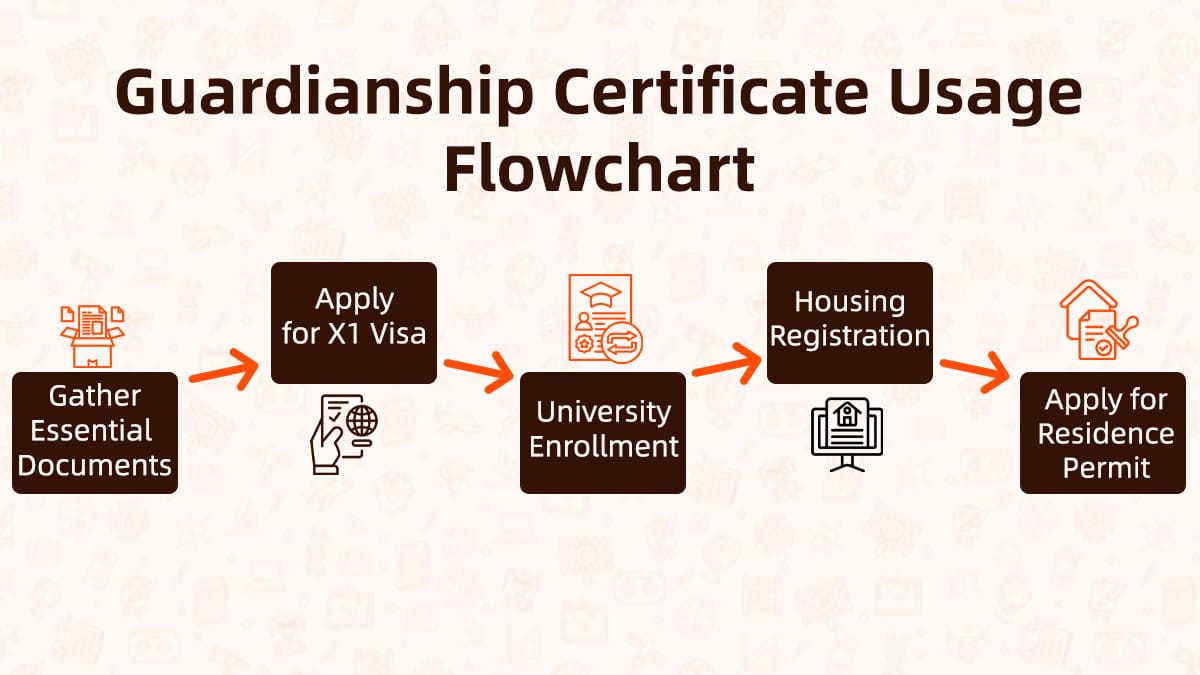Introduction
Foreign students under 18 who study in China need legal guardianship. This protects young learners and follows Chinese law. All students under 18 who study in China must find a guardian through the adult guardianship system.
Student guardianship in China is more than paperwork. It helps with visas and school enrollment. Chinese language schools need guardianship for international students. They require this before accepting minors into their programs.
The guardianship program in China follows strict rules under the adult guardianship law. Parents must choose a local guardian who lives in China. This guardian handles daily needs and emergency situations for the student, serving essential social functions.
Getting notarization in China usually takes several working days to a few weeks, depending on the city and whether additional authentication is required. Starting early prevents delays. The process has three parts: document preparation, authentication, and final notarization at Chinese offices.
Help us match families with top schools in China. Take our 1-minute survey to share what matters most.
Understanding Guardianship Requirements in China
Chinese law requires guardianship for minors under 18. This applies to all education programs. The adult guardianship system in China covers students who study in China, including Chinese language schools and cultural exchange programs. This system provides crucial social support for underage guardianship cases.
Who Can Serve as a Guardian
Guardianship requirements in China specify rules for guardians. Guardians must be adults living in China. The person must meet these criteria:
- Be over 18 years old
- Live in the same city as the student
- Have stable housing and income
- Have local residence permit or Chinese ID card
Many families choose relatives in China, but the relative must meet local and university guardianship requirements. Others choose family friends or professional guardianship services like Alifa Education Services. Universities that have Chinese language programs often recommend trusted guardians through their guardianship and support system.
To learn more about the services offered by Alifa Education, please visit our dedicated page. Whether you are a guardian, affiliated with an international or bilingual school in China, or a study abroad education agency, Alifa Edtech offers services tailored to your unique needs. Please visit our page to learn more about our offerings.
Legal Framework for Student Guardianship
Student guardianship follows Chinese civil law. The adult guardianship law in China protects minor foreigners who study in China. Parents keep full custody rights but give daily care duties to a local guardian (usually required to be a Chinese citizen with a valid ID, unless the university allows a foreign resident with a valid permit).
The guardian handles these tasks and social functions:
- School meetings and communication
- Medical visits and emergencies
- Visa renewals and police registration
- Banking help when needed
- Permission for school trips
Guardianship for foreign students requires written consent from parents. Single parents need extra documents that prove sole custody. The adult guardianship system ensures proper legal protection for all underage guardianship arrangements.
Age and Duration Rules
Guardianship for foreign minors under 18 studying in China applies to all students under this age. The arrangement lasts until the student turns 18 or leaves China.
Once a student turns 18 (based on their passport age), guardianship ends automatically. Some schools may require the student to update records or submit a simple notice, but no formal contract or ceremony is needed.
Step-by-Step Guide to the Notarisation Process

The notarization in China process has six main steps. Each must be done in order to ensure successful setup of the adult guardianship system.
Step 1: Choose Your Guardian
Find a suitable guardian in China, usually a Chinese citizen with valid ID, or a foreigner with residence permit and visa, clean record, and living near the student's school. Contact them to confirm they can help with the underage guardianship responsibilities. Get their basic information:
- Full name and address
- ID number or passport details
- Job information
- Phone and email
Your chosen guardian visits a notary office in the same city or district as the student's university. They sign a "Guardian Acceptance Letter" in Chinese. This shows they agree to serve as guardian under China's adult guardianship law.
Want to put your brand in front of families, students, and education-focused readers? We're inviting select partners to advertise with us on our trusted blog.
Want to get featured? Click 'Learn more' and submit a story for us to include.
Step 2: Prepare Home Country Documents
Gather required papers while your guardian handles their part. You need these documents:
Parent Authorization Letter: Write a letter naming the Chinese guardian. Include your child's full name, guardian details, and the period. Both parents must sign.
Birth Certificate: Get an official copy of your child's birth certificate. This proves age and parentage for the underage guardianship arrangement.
Passport Copies: Copy your child's passport and parents' passports. Include all pages with stamps.
Custody Papers: If parents are divorced, include custody agreements. These show who makes guardianship decisions.
Step 3: Authenticate Documents
All papers need authentication for use in China. The process varies by country but includes these steps:
Local Notarization: Have documents notarized by a notary office in your home country.
Government Authentication: Submit notarized papers to your foreign ministry or secretary of state.
Chinese Consulate Legalization: Take authenticated documents to the Chinese consulate. They provide final approval required for guardianship program acceptance in China.
Some countries use an apostille instead of consular legalization. Check with the Chinese consulate about which method your country uses for notarization in China.
Step 4: Get Chinese or English Translation
All foreign documents need certified Chinese or English translations. Use services approved by Chinese authorities for the adult guardianship system.
Keep originals, authenticated versions, and Chinese or English translations together. Label each set clearly to avoid mix-ups during the notarization in China process.
Step 5: Submit at Chinese Notary Office
Your guardian submits all papers at a local Chinese notary office. Required items include:
- Guardian's Chinese ID card
- Guardian Acceptance Letter (signed earlier)
- Your authenticated documents
- Student's passport and visa
- Application form from the notary office
The notary office reviews everything and schedules a final appointment for the guardian to attend and sign. The student's presence is not required for this notarization in China step.
Required Documents and Common Pitfalls

Success needs correct documents and avoiding typical mistakes in the adult guardianship system. Here's what you need and what to watch for.
Essential Document List
From Home Country:
- Parent Authorization Letter (notarized and authenticated)
- Birth certificate (authenticated)
- Parent passports (copies, authenticated)
- Custody documents, if needed (authenticated)
- Student passport and Chinese visa
From Chinese Guardian:
- Guardian Acceptance Letter (notarized at local notary office in same city or district as student's university)
- Guardian's Chinese ID
- Household registration book (Hukou)
- Income proof
Additional Items:
- Certified Chinese translations of all foreign papers
- Photos of students and guardians
- School admission letter from Chinese language program
Using Your Guardianship Certificate
Once you get the Guardianship Notarization Certificate, you will use it in these key stages:
Applying for X1 Visa
When you submit your X1 visa application to a Chinese embassy or consulate, include the original and copy of this notarization. These are core required documents for the adult guardianship system.
University Enrollment and Housing Registration
After arriving in China, present the original "Guardianship Notarization Certificate" when completing formal enrollment at your university's international student office. You may also need this document when registering for on-campus or off-campus housing under the underage guardianship arrangement.
Applying for Residence Permit
Within 30 days of entry, visit the local Public Security Bureau's Exit-Entry Administration to convert your X1 visa into a residence permit. During this process, the "Guardianship Notarization Certificate" serves as the key legal document proving you have a legal guardian in China under the adult guardianship law.
Tips for a Smooth Application, Fees, and Timelines
Planning ahead helps ensure successful guardianship through China's adult guardianship system. Understanding costs prevents delays.
Timeline Planning
Total Time: 6-8 Weeks
Weeks 1-2: Preparation
- Find and confirm guardian
- Gather home country documents
- Start authentication
Weeks 3-4: Authentication
- Complete government authentication
- Get Chinese consulate approval
- Arrange translations
Weeks 5-6: Submission
- Guardian submits papers at Chinese notary office
- Complete notarization in China
Weeks 7-8: Completion
- Receive Guardianship Certificate
- Submit to language school
- Finish visa and registration
Cost Breakdown
Home Country Costs:
- Document notarization: $20-50 per document
- Government authentication: $25-75 per document
- Chinese consulate fees: $20-50 per document
- Translation services: $15-35 per page
China Costs:
- Guardian letter notarization: 100-300 RMB
- Final guardianship notarization: 200-500 RMB
- Processing fees: 50-200 RMB
Total Expected: $300-800 USD
Costs vary by location. Cities typically charge more than smaller areas for notarization in China services.
Avoiding Delays
Start Early: Begin 3 months before arrival in China. This allows time for fixes if problems occur with the adult guardianship system setup.
Stay in Touch: Keep regular contact with your guardian. Language barriers can cause confusion in underage guardianship arrangements.
Have Backups: Keep alternative guardian options ready. Use these if your first choice cannot help with the guardianship and support system.
Track Progress: Monitor authentication at each stage. Follow up quickly if delays occur during notarization in China.
Conclusion
You've made it through the steps for foreign student guardianship under China's adult guardianship law. Now, let's wrap up with key thoughts to ease your mind.
Foreign student guardianship through the adult guardianship system doesn't have to feel overwhelming. Simple planning makes the notarization in China process go smoothly. With the right papers and timelines, your child's study abroad dream is within reach.
Questions about next moves might arise, but remember, early action cuts stress. The underage guardianship arrangement brings peace of mind, opening doors to new experiences through proper guardianship and support systems.
Need help with guardianship notarization for studying in China? Book a free consultation with Alifa today. Get step-by-step help to secure the right documents for your child's Chinese language program.
Related Articles













Member comments